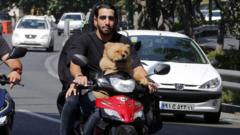In a controversial move, Iranian officials have expanded a ban on dog walking that originated in the capital, Tehran, to many other cities across the nation, justifying the action based on worries regarding public order and safety. The latest enforcement prohibits dog ownership in public spaces, enforcing the existing prohibitions that have been in effect since 2019. Alongside walking, transporting dogs within vehicles has also been declared illegal.
**Iran Enforces Widespread Ban on Dog Walking, Expanding Restrictions Nationwide**

**Iran Enforces Widespread Ban on Dog Walking, Expanding Restrictions Nationwide**
Iran has initiated a nationwide crackdown on dog walking, citing health and public safety concerns as authorities extend earlier bans from Tehran to at least 18 additional cities.
Despite the regime's longstanding disapproval of pet ownership—a sentiment stemming from cultural and religious perspectives since the 1979 Islamic Revolution—the trend of dog ownership is subtly rising, particularly among the youth. Many view having a dog as a form of cultural resistance against the restrictive practices mandated by the government.
Cities like Isfahan and Kerman have recently jumped on the bandwagon, tightening restrictions, while prosecutors have remarked on the necessity of "legal action" against violators. Nonetheless, reports indicate uneven enforcement of these bans; numerous dog owners still persist in walking their pets throughout Tehran and other urban areas.
Continued restrictions have fueled frustration among citizens. Authorities, explaining their stance, claim "dog walking poses a threat to health, peace, and comfort," according to Abbas Najafi, Hamedan's prosecutor. Unfortunately, this has resulted in arrests and even the confiscation of pets in some instances.
The Islamic regime has generally perceived pet ownership as un-Islamic, influencing the legal landscape significantly. In past statements, Supreme Leader Ayatollah Ali Khamenei has denounced the ownership of dogs outside specific functional roles, while lawmakers have expressed concerns that the practice could threaten the fabric of Iranian life and morality.
Amidst criticism surrounding existing security issues in Iran, detractors argue that law enforcement resources would be better utilized elsewhere, rather than targeting dog owners. The trend mirrors other forms of dissent against the regime, including ignoring stringent hijab laws and the partaking in underground social activities.
This crackdown on pet ownership highlights the complex interplay between personal liberties and governmental control in a nation navigating stringent cultural and religious principles.
Cities like Isfahan and Kerman have recently jumped on the bandwagon, tightening restrictions, while prosecutors have remarked on the necessity of "legal action" against violators. Nonetheless, reports indicate uneven enforcement of these bans; numerous dog owners still persist in walking their pets throughout Tehran and other urban areas.
Continued restrictions have fueled frustration among citizens. Authorities, explaining their stance, claim "dog walking poses a threat to health, peace, and comfort," according to Abbas Najafi, Hamedan's prosecutor. Unfortunately, this has resulted in arrests and even the confiscation of pets in some instances.
The Islamic regime has generally perceived pet ownership as un-Islamic, influencing the legal landscape significantly. In past statements, Supreme Leader Ayatollah Ali Khamenei has denounced the ownership of dogs outside specific functional roles, while lawmakers have expressed concerns that the practice could threaten the fabric of Iranian life and morality.
Amidst criticism surrounding existing security issues in Iran, detractors argue that law enforcement resources would be better utilized elsewhere, rather than targeting dog owners. The trend mirrors other forms of dissent against the regime, including ignoring stringent hijab laws and the partaking in underground social activities.
This crackdown on pet ownership highlights the complex interplay between personal liberties and governmental control in a nation navigating stringent cultural and religious principles.






















